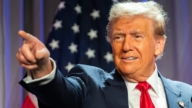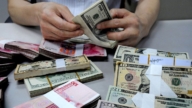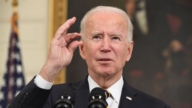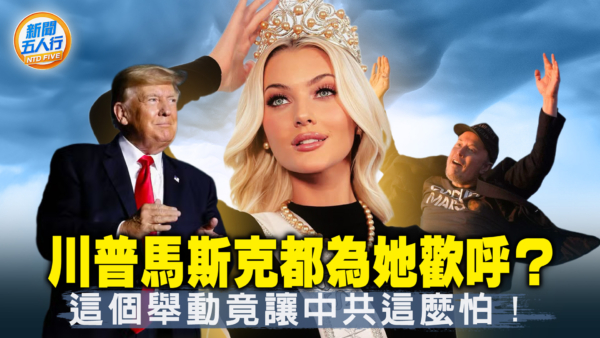【新唐人2014年03月07日訊】日前,上海「超日太陽能科技股份有限公司」表示,將無法向投資者全額支付即將到期的債券利息,而這次中共政府也沒有像以往一樣出面救助。評論認爲,今年中國大陸,可能將出現大面積的信用及債券違約現象,政府同樣沒有錢,不會繼續救助,民衆有必要看緊自己的錢袋子。
「超日太陽」日前宣佈,對於兩年前發行的10億元人民幣債券,公司無力支付,應該在3月7號到期的大約人民幣9000萬元的利息,由於不可控因素,公司只籌集到400萬元人民幣支付。
「超日太陽」是一家生產太陽能板的企業,有報導說,「超日」公司本部生產線已經陷入停產,公司僅剩下位於九江,和洛陽的兩家子公司在經營代理加工業務。
「超日太陽」常務副總裁陶然在接受國外媒體採訪時表示,目前已不指望從金融機構,和地方政府取得支持,公司已經著手變賣海外的部分電站項目,但出價太低,目前正在協商。
大陸經濟學者鄧先生:「救命稻草政府不會再給他了,這是肯定的,因爲政府也沒有錢,政府管實際就是全民買單,這樣造成的惡果就是壓制和帶壞其他的模式。」
實際上,「超日太陽」並不是中國第一家面臨違約困境的公司。上個月,「山西聯盛能源有限公司」因爲接近300億元的金融負債,無法支付工資、稅款、工程款等,由於資不抵債,公司在當地政府的幫助下,開始破產重組。
1月31號,「中誠信託誠至金開1號」集合信託產品,30億元債券也面臨違約,最終由當地政府兜底解決。不過還是不能支付第三期利息。
美國南卡羅來納大學艾肯商學院教授謝田:「我們不知道它那些救助的背後有哪些私人利益的交換,爲甚麼要救助,救助時拿的是政府的錢,實際是拿著公衆的錢,在挽救一小夥公司的擁有者,本來就是一個劫貧濟富的過程,不光是不合法的,在道德上都是站不住腳的。」
2月下旬,「中信證券」發佈報告,估算2014年將有7966只信託產品到期,規模合計9071億元,考慮利息支付的因素,本息合計1萬億元。
中國金融資訊平臺《華爾街見聞》網,日前整理出12支今年違約風險高的信託產品。根據美國銀行的分析報告,《華爾街見聞》的報導形容中國的信託違約,猶如一觸即發的火藥筒,同時強調,「美銀」分析報告的數據,實際上只覆蓋了中國信託市場的1/8。美銀估計,截至1月底,中國企業債市場規模高達8萬7000億人民幣,遠遠高過 2007年底的8000億人民幣。
另外根據大陸理財網站報導,中國2014年面臨高違約風險的信託產品,達14款。
謝田:「在中國政府幕後大力擔保的情況下,這麼多企業、債券都陸陸續續出現違約,是中國整個信貸市場、債務市場大面積崩潰的第二槍了,大面積違約開始發生的時候,地方政府想去保護也沒辦法,因爲地方政府本身也債臺高築。」
據美國《華爾街日報》分析,用高利貸避免違約會導致風險更高的放貸行為,可能造成已經存在產能過剩問題的行業,出現更多的投資浪費。
那麼,面臨如此多違約的債務到底怎麼解決?
鄧先生:「克服的方式有幾種,協調、轉移、拖延、消化、轉嫁,你的問題實在很嚴重了,我們只好把矛盾上交,讓中央政府去裁製。」
謝田:「資本主義不光只有市場經濟,同時還伴有公平的競爭,合理的法律制度,和自由的輿論監督,在中國是沒有的,權貴資本主義,假藉資本主義的融資方式來聚斂錢財,但是政府並不是公正的,也沒有自由的媒體把公司的財務、人事狀況、背後的機密都公布出來。」
美國南卡羅來納大學艾肯商學院教授謝田指出,在西方社會,政府官員和企業之間不會有利益關係,但是政府出資解決企業困境,也是行不通的。當年美國政府救助底特律汽車公司,就遭到民衆反對。
採訪編輯/劉惠 後製/鍾元
Credit and Bond Train Wrect – Debt Time Bomb Is On Brink of Explosion
Shanghai Chaori Solar Energy Science And Technology Co., Ltd
recently indicated that it would not be able to pay investors
the full amount of interest on maturing bonds.
This time the Chinese Communist Party (CCP) government
has not come forward to the rescue.
Critics speculate that large scale credit and bond defaults
might happen in China.
The government also has no money, so it will not continue to
come to the rescue.
People need to closely watch their money.
Shanghai Chaori Solar Energy Science And Technology
Co., Ltd (Chaori Solar),
recently has announced that it was unable to pay the 90
million yuan interest due on March 7 of the 1 billion yuan
bonds issued two years ago.
Due to uncontrollable factors, the Company only raised
four million yuan for the payments.
Chaori Solar is a manufacturer of solar panels.
Some reports indicated that the production line
at its headquarters has stopped.
The company only has two subsidiary offices located in
Jiujiang and Luoyang for agent processing of business.
Chaori Solar Executive Vice President Tao said
during an interview with foreign media,
the company does not expect to get support from
financial institutions or local government.
The company has started to sell some of its
power plant project abroad, and is currently in
negotiation due to the low bids.
Chinese economist Mr. Deng:
“The Government will not provide the last straw for survival.
That’s for sure, because the government has no money.
Government bailout is to let the people pay for it.
The consequences are repression and degeneration."
In fact, Chaori Sola is not the first company in China
that faces default.
Last month, Shanxi Liansheng Energy Co,.Ltd
began bankruptcy reorganization with the help of
the local government,
because it could not pay wages, taxes, projects
due to its nearly 30 billion yuan financial liabilities.
On January 31, trust products of 300 million yuan bonds of
Zhongcheng Trust Chengzhijinkai Number One
was facing default.
It was eventually resolved by the local government.
But they still cannot pay the interest on the third phase.
Professor Xie Tian at Aiken School of Business
University of South Carolina: “We do not know the interests
behind those bailout, why did the government rescue,
did government use its own money or people’s money
to save a small number of business owners?
It has always been a process of robbing the poor
to help the rich. It is not only illegal, but also immoral."
In late February, CITIC Securities issued a report
estimating 2014 will have 7,966 trust products due
in the amount of 907.1 billion yuan.
With interest payments added, the total is one trillion yuan.
China’s Financial Information platform wallstreetcn.com
recently ranked 12 trust products with a high risk of default in 2014.
According to a report of Bank of America, http://wallstreetcn.com
describes China’s default of trust as an explosive gunpowder barrel.
It also stressed that the data of Bank of America’s report
only covers 1/8 of China’s trust market.
Bank of America estimates that as of the end of January,
Chinese corporate bond market is 87,000 billion yuan,
much higher than the 800 billion yuan at the end of 2007.
Also, according to a report from a financial website,
there are 14 products facing a high risk of default in 2014.
Xie Tian: “With Chinese government as the strong guarantor,
so many companies and bonds still result in default.
This is the second blow to the entire credit market in China.
Local government cannot help with such large scale default,
as local governments themselves are deep in debt."
According to the U.S. Wall Street Journal analysis,
to avoid default with usury would lead to
higher risk of lending behavior,
and may result in the already existing overcapacity
being a more wasteful investment.
So, what is the solution for so much debt default?
Mr. Deng: “There are several ways to overcome the issue.
Coordination, transfer, delay, passing, etc.
If the issue is really very serious, it is handed over to the top.
Ask the central government to handle it."
Xie Tian: “Capitalism is not only about market economy,
it also has fair competition, a reasonable legal system and
freedom of public expression.
China does not have these. China is about crony capitalism.
It uses the capitalist mode of financing to amass money.
The government is not fair, nor is there free media
to publish the inside information of finance, personnel and etc."
Xie Tian pointed out that in Western society
there is no collusion between government officials and businesses.?
If the government bails out enterprises, it is not feasible.
When U.S. government tried to bailout auto companies in Detroit,
it faced public opposition.
Nevertheless the US Government went ahead with the wholesale
bail-out a wide variety of businesses.
Interview & Edit/Liu Hui Post-Production/Zhong Yuan



























